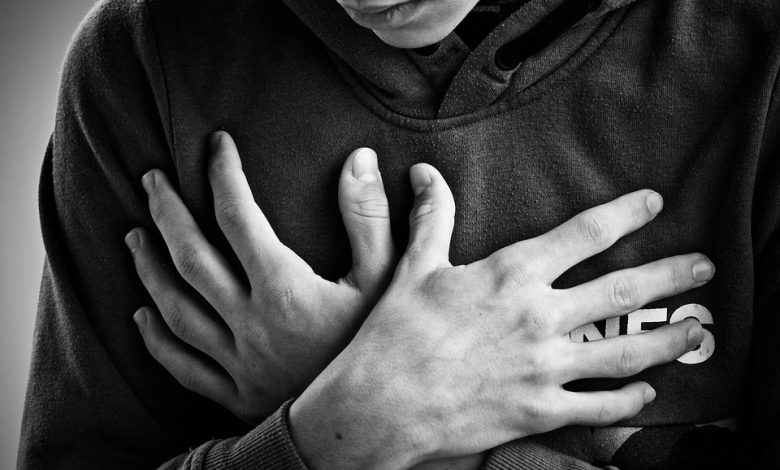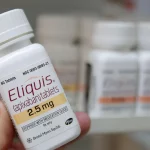Does Eliquis Cause Depression or Anxiety?

Eliquis (apixaban) was developed by Bristol-Myers Squibb and Pfizer as a medication for the prevention of blood clots and the reduction of the risk of stroke in patients with nonvalvular atrial fibrillation, and for the treatment and prevention of deep vein thrombosis and pulmonary embolism.
The development of Eliquis began with the identification of a target protein called factor Xa, which is involved in the blood clotting process. Scientists at Bristol-Myers Squibb and Pfizer worked to develop a molecule that could selectively inhibit factor Xa, without affecting other clotting factors in the blood.
The initial molecule was tested in preclinical studies, and showed promising results in inhibiting factor Xa and preventing blood clots. Clinical trials were then conducted to test the safety and efficacy of the medication in humans.
The clinical trial program for Eliquis involved more than 94,000 patients in 14 different trials, making it one of the largest clinical trial programs ever conducted for an anticoagulant medication. The trials demonstrated that Eliquis was effective in preventing blood clots and reducing the risk of stroke, while also being well-tolerated with a lower risk of bleeding compared to warfarin.
Eliquis was approved by the US Food and Drug Administration (FDA) in 2012 for the prevention of stroke and systemic embolism in patients with nonvalvular atrial fibrillation, and in 2014 for the treatment and prevention of deep vein thrombosis and pulmonary embolism. Since its approval, Eliquis has become a widely used medication for the prevention of blood clots and the reduction of the risk of stroke in patients with atrial fibrillation and other conditions.
How Is Eliquis Taken?
Eliquis (apixaban) is a prescription medication that comes in tablet form and is taken orally, typically twice a day with or without food. The dosage and duration of treatment will depend on the condition being treated, the patient’s age, weight, and medical history, as well as other factors.
For atrial fibrillation, the usual dose of Eliquis is 5 mg taken orally twice a day, although some patients may require a lower dose depending on certain factors. For the treatment of deep vein thrombosis or pulmonary embolism, the initial dose is typically 10 mg taken orally twice a day for the first 7 days, followed by 5 mg taken orally twice a day for the remainder of the treatment period.
It’s important to take Eliquis as directed by a healthcare provider and not to change the dose or stop taking the medication without first consulting with a doctor. It’s also important to not miss doses, as this can reduce the effectiveness of the medication.
If a dose is missed, it should be taken as soon as possible on the same day. If it’s already close to the time of the next dose, the missed dose should be skipped and the regular dosing schedule resumed. Patients should not take extra doses to make up for a missed dose.
Eliquis should be stored at room temperature and kept in its original container with the lid tightly closed. Any unused tablets should be properly disposed of according to local regulations.
Does Eliquis Cause Depression or Anxiety?
The link between depression or anxiety and Eliquis remains unclear because there is no strong evidence to suggest that Eliquis (apixaban) directly causes depression or anxiety as a side effect. However, it is possible that some patients may experience these symptoms as a result of taking the medication or due to other factors related to their medical condition.
While depression and anxiety are not listed as common side effects of Eliquis, some patients may experience mood changes or cognitive disturbances while taking anticoagulant medications such as Eliquis. This could be due to the medication’s effects on the clotting factors in the blood or due to other factors related to the patient’s underlying medical condition.
It’s important to note that depression and anxiety can be common in patients with certain medical conditions, such as atrial fibrillation or deep vein thrombosis, which are conditions for which Eliquis is often prescribed. Additionally, the stress and anxiety associated with managing a chronic medical condition can also contribute to the development of these symptoms. Not all patients who take Eliquis will experience depression or anxiety. Additionally, some patients may be more susceptible to these side effects due to their medical history or other medications they are taking.
If you are experiencing depression or anxiety while taking Eliquis, or if you have a history of these conditions, it’s important to discuss your symptoms with your healthcare provider. They can help determine the underlying cause of your symptoms and develop an appropriate treatment plan. In some cases, a change in medication or additional therapies may be necessary to manage these symptoms.
Does Eliquis Make You Sleepy?
Drowsiness is not a common side effect of Eliquis (apixaban). While some patients may experience fatigue or weakness while taking Eliquis, these symptoms are generally mild and uncommon.
If you are experiencing excessive drowsiness or fatigue while taking Eliquis, it’s important to discuss your symptoms with your healthcare provider. They can help determine the underlying cause of your symptoms and develop an appropriate treatment plan.
In some cases, excessive drowsiness or fatigue may be a sign of an underlying medical condition or medication interaction. Your healthcare provider may recommend adjusting your medication dosage, changing your medication, or additional testing to rule out any underlying medical conditions.
How To Cope With Depression And Anxiety While On Eliquis
If you are experiencing depression or anxiety while taking Eliquis, there are several things you can do to help manage these symptoms:
1. Talk to your healthcare provider: It’s important to discuss your symptoms with your healthcare provider, as they can help determine the underlying cause of your symptoms and develop an appropriate treatment plan. They may recommend therapy or medication to help manage your depression or anxiety.
2. Practice stress management techniques: Engaging in stress-reducing activities such as exercise, meditation, or yoga can help manage symptoms of depression and anxiety.
3. Stay connected with others: Isolation can worsen symptoms of depression and anxiety, so it’s important to stay connected with friends and family. You can also consider joining a support group for people with similar medical conditions.
4. Maintain a healthy lifestyle: Eating a balanced diet, getting enough sleep, and avoiding alcohol and drugs can help improve your mood and reduce symptoms of depression and anxiety.
5. Educate yourself: Learning more about your medical condition and the medication you are taking can help reduce anxiety and increase feelings of control. You can talk to your healthcare provider or search for reputable sources of information online.
It’s important to remember that everyone’s experience with depression and anxiety is unique, and what works for one person may not work for another. If you are struggling to manage your symptoms while taking Eliquis, be sure to talk to your healthcare provider to develop a personalized plan for managing your mental health.





